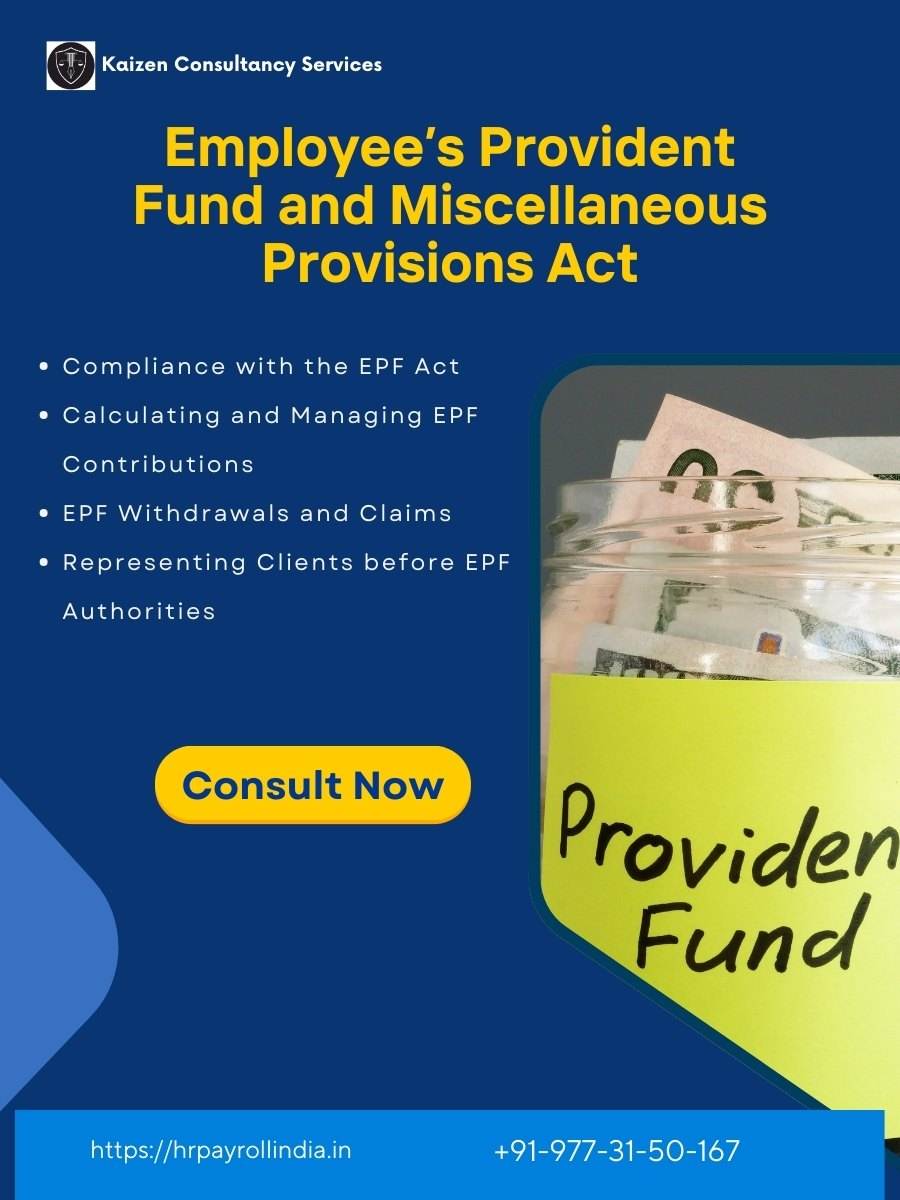PF Compliance for Healthcare
- Complete Guide
The Employees’ Provident Fund (EPF) is a significant social security scheme in India, established under the Employees’ Provident Funds and Miscellaneous Provisions Act of 1952.
Understanding EPF Registration and Compliance for Healthcare Employers
A Provident Fund Consultant in Mumbai – plays a vital role in ensuring that businesses comply with the regulations set forth by the Employees’ Provident Fund Organization (EPFO).
This blog post will explore the PF Compliance for Hospital process from an employer’s perspective, particularly in the healthcare industry, and highlight how compliance differs in this sector.

Understanding EPF Registration for Hospitals Employers
Healthcare establishments, such as Hospitals, Diagnostic centres, Pharmaceutical companies, Nursing homes, Individual Practitioners and related businesses, must comply with EPF regulations if they employ 20 or more individuals, which is generally the case. The EPFO oversees this process, ensuring that employees receive their rightful benefits.
Registration is mandatory within one month of reaching the employee threshold to avoid penalties.

Why EPF Registration is Crucial for Healthcare Employers
- Legal Compliance: The law mandates EPF registration for healthcare employers with 20 or more employees. Non-compliance can lead to fines and legal repercussions.
- Employee Welfare: EPF provides a safety net for employees, ensuring they have savings for retirement and emergencies. This is particularly important in the healthcare sector, where job stability can be unpredictable.
- Attracting Talent: Offering EPF benefits can make healthcare organizations more attractive to potential employees. It demonstrates a commitment to employee welfare and financial security.
Step-by-Step Guide for PF Registration of Healthcare Sector
- Required Documents: Employers need to prepare essential documents such as the company's PAN, business registration details, and employee information.
- Access the EPFO Portal: Employers should visit the official EPFO website to initiate the registration process. An account on the Unified Shram Suvidha Portal (USSP) must be created.
- Complete the Registration Form: Fill out the online registration form accurately, providing details about the establishment and its employees.
- Upload Necessary Documents: Essential documents must be uploaded as part of the registration process.
- Submit and Confirm: After reviewing all information for accuracy, submit the application and track its status online.
Appoint a PF Consultant who will take care of all procedures on your behalf.
To read the importance of a Dedicated PF Consultant, read the blog post.
👇
What are unique challenges faced regarding PF compliance for Hospital
Hospitals and clinics often experience high turnover rates, requiring continuous updates to employee records and contributions.
Healthcare establishments may employ a mix of permanent, contractual, and temporary staff, complicating compliance with EPF regulations.
Given the critical nature of healthcare services, these establishments may face more stringent scrutiny from regulatory bodies regarding compliance with EPF norms.

EPF Registration and Compliance Guide for Healthcare Sector in India
The healthcare sector in India is one of the fastest-growing industries, encompassing various segments from hospitals to pharmaceutical companies. Understanding EPF (Employees' Provident Fund) registration and compliance requirements is crucial for healthcare employers.
Let's dive deep into the specifics of EPF regulations for the healthcare industry.
What Constitutes the Healthcare Industry?
According to the National Industrial Classification (NIC) codes used by the Ministry of Statistics and Programme Implementation, the healthcare industry includes:
- Hospitals and Clinical Establishments
- Public and private hospitals
- Specialty and multi-specialty hospitals
- Nursing homes
- Dental clinics
- Mental health facilities
- Diagnostic Centers
- Pathology laboratories
- Diagnostic imaging centers
- Medical testing facilities
- Pharmaceutical Companies
- Drug manufacturers
- Research and development units
- Pharmaceutical packaging units
- Allied Healthcare Services
- Wellness centers
- Physiotherapy clinics
- Alternative medicine centers
- Blood banks
- Ambulance services
EPF Registration Requirements for Healthcare Establishments
Basic Eligibility Criteria
As per the Employees Provident Fund and Miscellaneous Provisions Act, 1952, healthcare establishments must register for EPF if they:
👉 Employ 20 or more persons
👉 Are engaged in any of the activities mentioned above
👉 Operate as a registered entity (Private limited, Partnership, Proprietorship, etc.)
Special Considerations for the Healthcare Sector
- Coverage of Medical Staff
- All regular doctors, nurses, and paramedical staff are covered
- Visiting consultants on payroll must be included
- Contract workers through licensed contractors fall under separate provisions
- Wage Ceiling
- Basic wage ceiling for mandatory EPF membership is ₹15,000
- Healthcare professionals drawing higher salaries can voluntarily opt for EPF
- Special provisions exist for teaching hospitals and research institutions

Special Provisions for Healthcare Sector
- Teaching Hospitals
Educational Component
- Special provisions for resident doctors
- Treatment of stipend under EPF
- Research staff coverage
Multi-Location Establishments
Code Management
- Separate codes for different locations
- Consolidated returns option
- Inter-unit transfer provisions
- Digital Compliance Platform
The EPFO has introduced several digital initiatives specifically beneficial for healthcare establishments:
- Universal Account Number (UAN)
- Single number for all employees
- Easy transfer during job changes
- Online claim settlement
- e-Sign Facility
- Digital signature for returns
- Paperless compliance
- Reduced processing time
Penalties for Non-Compliance
Healthcare establishments should be particularly careful about:
- Late Payment Charges
- 12% per annum on delayed payments
- Additional damage charges up to 100%
- Prosecution in severe cases
- Documentation Lapses
- Penalties for incorrect returns
- Consequences of misclassification
- Impact on establishment registration
Best Practices for Healthcare Establishments
- Record Keeping
- Maintain detailed employee records
- Document attendance and wage records
- Keep contract worker details
- Internal Controls
- Regular internal audits
- Monthly reconciliation
- Training for compliance staff
Recent Updates and Changes for Healthcare
The EPFO has introduced several changes affecting healthcare establishments:
- COVID-19 Related Provisions
- Special withdrawal facilities
- Extended filing deadlines
- Relief measures for the healthcare sector
- Digital Initiatives
- e-nomination facility
- Online claim settlement
- Digital compliance platform
If you're an Healthcare enterprise in India looking to ensure compliance with the Employees Provident Fund Compliance with Act in best possible way, contact the expert team of Kaizen Consultancy Services in Mumbai.
Call us at +91-977 31 50 167 to schedule a consultation and learn how we can assist your business.
